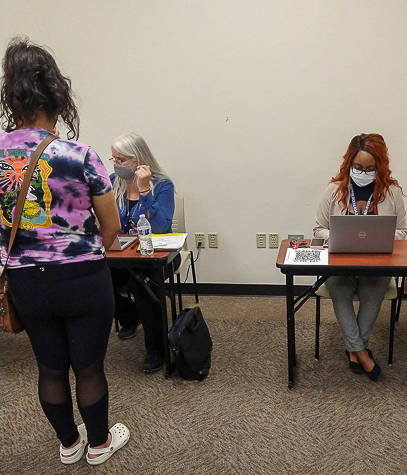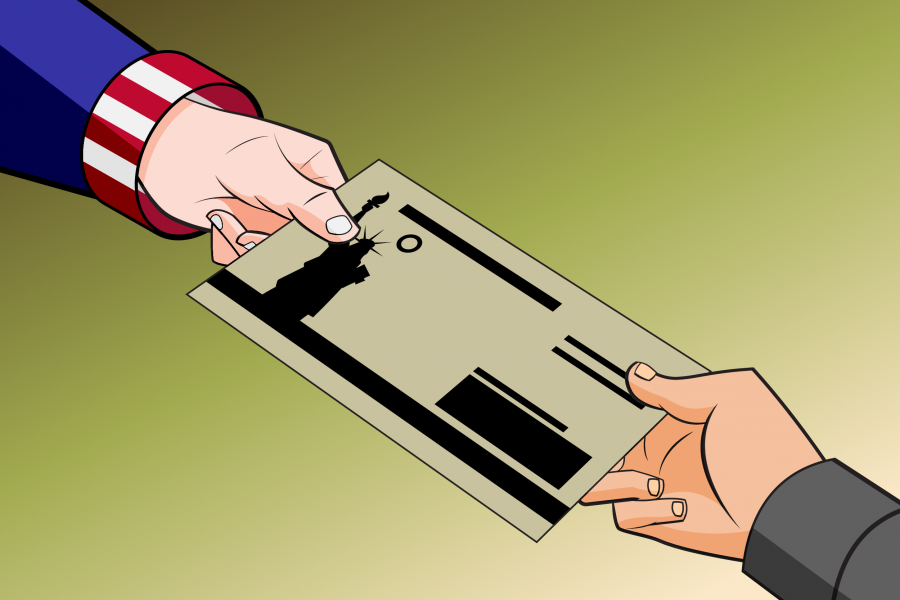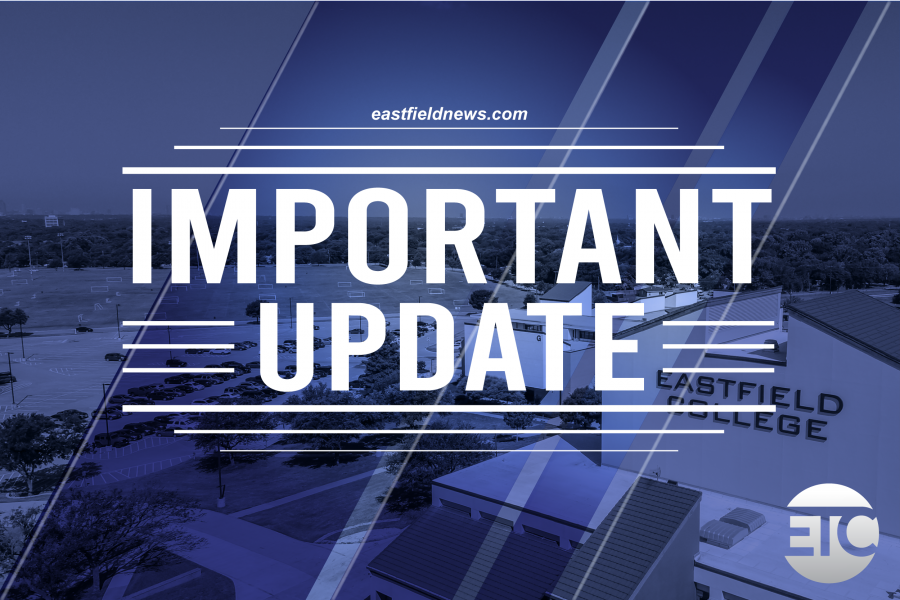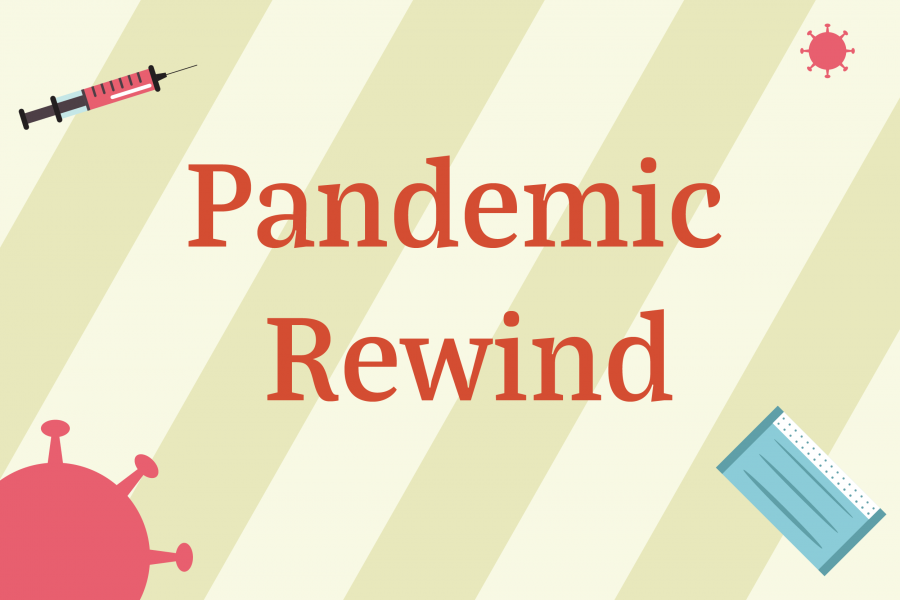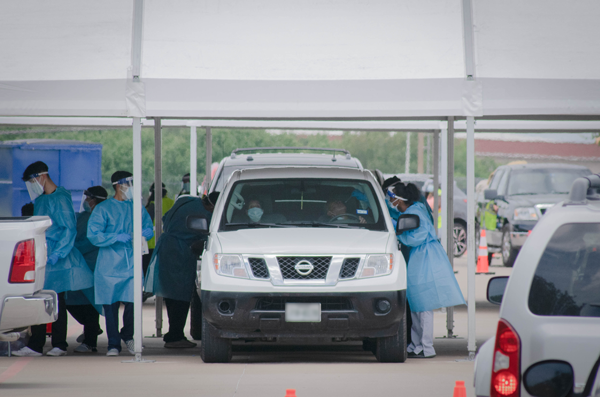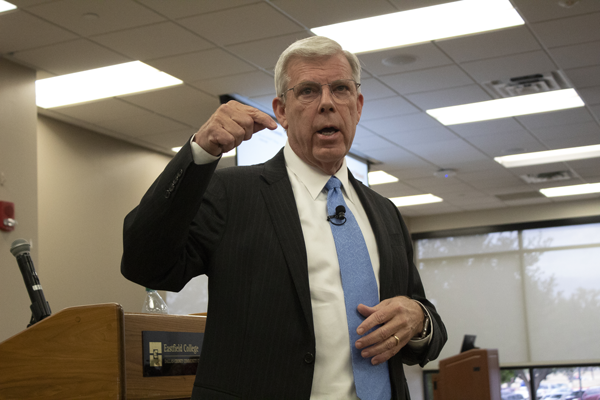
By HARRIET RAMOS
@HarrietRamosETC
In response to the COVID-19 crisis, Dallas County Community College District Chancellor Joe May has assembled a Rapid Response Team to address the needs of students, staff and faculty as they navigate the logistics of learning and working remotely.
The RRT is composed of six taskforces: student academic success, student support services, employee care and remote working, scenario assessment, operational continuity and communication.
May said they will be meeting every Monday, Wednesday and Friday.
“We’re dealing with now, but thinking about the future,” he said in an April 2 phone interview with The Et Cetera.
[READ MORE: Employee pay uncertain; updates on student refunds, grades]
Making sure students, faculty and staff have access to technology has been a focus of the RRT. Chief Innovations Officer Tim Marshall from the operational continuity taskforce said that has been a challenge due to the backlog of orders suppliers are experiencing due to the large numbers of schools and companies ordering hotspots and laptops for their employees.
“You can’t find them because there’s nothing to be found,” he said. “Nobody anticipated this demand.”
Marshall said he ordered 1,000 mobile hotspots for students at the beginning of spring break, but they haven’t been delivered. Once they are delivered, he said getting them to students is going to be another challenge because of shelter-in-place restrictions.
Marshall also ordered 200 laptops for faculty and staff, but he was told they probably won’t be delivered until mid-April. There were no plans to purchase laptops for students.
[READ MORE: 3 DCCCD students self-report positive COVID-19 test or exposure to virus]
Marshall said tablets were more readily available. He ordered 1,000 for faculty and staff, but they were delivered later than expected and the shelter-in-place order is making distribution difficult.
In addition to providing technology, the operational continuity taskforce, under the leadership of Executive Vice Chancellor Justin Lonon, will be looking ahead and trying to anticipate what might happen in the summer and fall in terms of the budget and enrollment. They don’t know what that will look like yet, but they are thinking through different scenarios so they can be prepared.
“Clearly we have students who have been impacted, maybe in the service industry and aren’t working right now,” Lonon said. “Individuals are having to make decisions about paying the rent or paying tuition on a go-forward basis, and so we want to make some of those decisions as easy as we can.”
[READ MORE: Stimulus checks arriving but not for all]
Eastfield history professor and Faculty Association President Liz Nichols is part of the student academic success taskforce. Nichols said they are looking for ways to best support students in the transition to online courses.
She said the most challenging area has been the Career and Technical Education programs where many of them have a lab component that is traditionally done on campus. Nichols said they are working with CTE faculty so they can get the resources they need for students to finish their classes on schedule and not have to come back at a later time to complete the lab portion.
“It’s really about the content experts [CTE faculty] doing the research … to determine what they feel is necessary in terms of virtual labs, videos, software so that students can continue their learning,” Nichols said. “We’re not advocating that any of that stop because it can’t be put online. There’s ways. We have to be creative.”
[READ MORE: Summer courses move to online only]
Nichols also said her group is maintaining a one-stop website with a frequently updated resource list to help faculty know what services are available to them in areas such as childcare or health and wellness.
This task force also made the decision to keep the DCCCD on the letter grade system instead of switching to pass/fail as universities across the country are doing. They based that decision on the understanding that students switching to four-year universities need a letter grade on their transcripts.
Joe Seabrooks, president of Cedar Valley and Interim Vice Chancellor for Student Success, leads the student support services task force. He said they are collaborating with the communication taskforce in reaching out to students via text messages and phone calls. As of April 7, they had made 10,000 calls to students to find out how they are doing, Seabrooks said at the Board of Trustees meeting last Tuesday.
Patty Arellano-Tolotta, DCCCD’s Chief Marketing and Communications Officer who heads up the communications taskforce, said they had sent out 56,000 text messages at the Board meeting.
[READ MORE: COVID-19 resources]
Seabrooks said they are finding that students’ biggest concern seems to be lost employment and/or lack of technology or Wi-Fi in their home.
Seabrooks said his area is working to connect employers with students who need employment using DCCCD’s WorkReadyU program in conjunction with Workforce Solutions of Greater Dallas.
“Although there are jobs that are no longer available, there also are a new set of jobs that are being created in this new economy,” he said. “We have made major connections with those companies and are trying to help students get matched with those opportunities as seamlessly as possible.”
Seabrooks said the new app WorkReadyMobile allows students to connect to job opportunities based on their program of study.
His team is also building a virtual student resource center through the DCCCD website. It will include information about enrollment and be a place where students can go to get questions answered. Even after the pandemic crisis is over, he wants to keep the center open and expand it.
“We want to really strengthen our virtual footprint with students, understanding that’s how many students navigate the world,” Seabrooks said. “We want to make things as convenient and as seamless as possible.”
— Skye Seipp contributed to this report
https://eastfieldnews.com/2020/04/15/mother-daughter-duo-students-medical-professionals-persevere-in-the-face-of-uncertainties/

